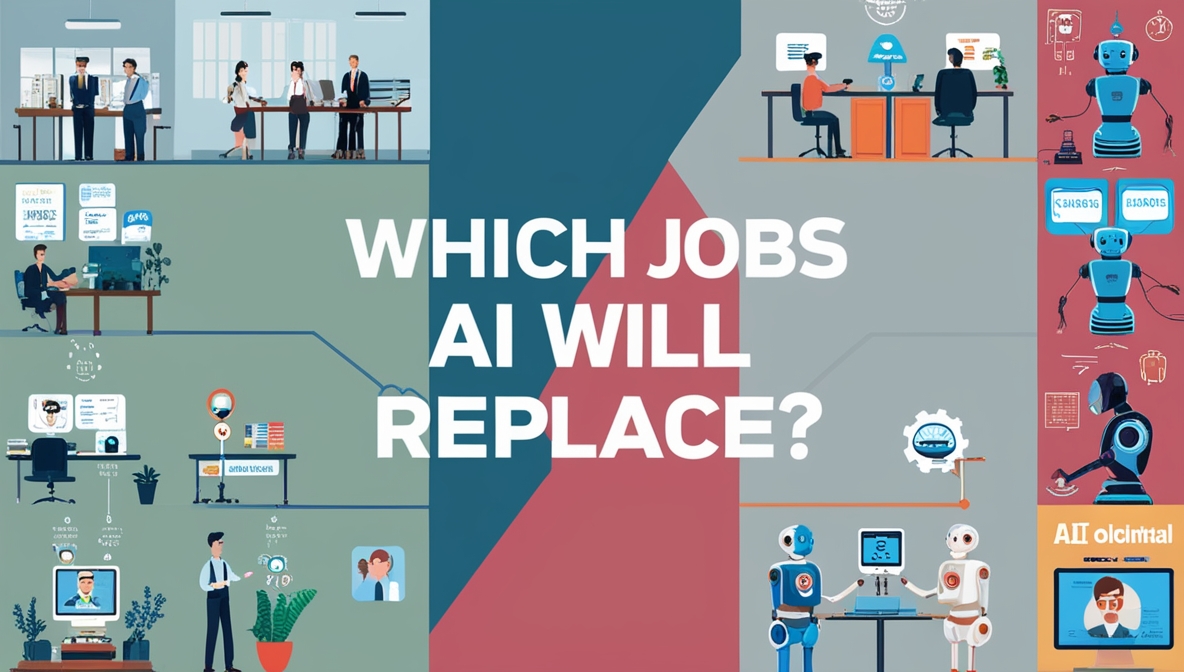AI is changing the way we work, creating both opportunities and concerns about job loss. As technology improves, many tasks that people do today might soon be done by AI. Some jobs, like data entry and customer support, are at risk because machines can perform these tasks faster and with fewer errors. This raises questions about the future of jobs in many industries.
In this article, we will discuss what jobs AI will replace and why. We’ll look at different types of roles most likely to be affected by AI, and how these changes might impact workers and the economy.
Jobs at Risk of Being Replaced by AI
Now, let’s talk about jobs. Some jobs are more at risk of being replaced by AI than others. Here are a few examples:
- Cashiers: When you go to a store and check out, you might see self-checkout machines. These machines can scan your items and take your money, so they don’t need a human cashier.
- Factory Workers: In factories, robots can assemble toys, cars, or even food. These robots can work faster and don’t get tired, which means some factory jobs might disappear.
- Drivers: There are also cars that can drive themselves! With self-driving technology, taxi drivers and delivery drivers might not be needed as much.
- Customer Service Representatives: Many businesses use chatbots to answer questions online. These AI tools can help customers without needing a human on the other end.
Job Loss: About 14% of jobs have been replaced by robots and AI in 2024.
Sectors Impacted: Many jobs in supply chains are gone, with 72% of companies cutting jobs because of AI.
New Opportunities: AI also creates jobs in data analysis and AI development.
Keep Learning: It’s important for workers to learn new skills to adapt to these changes
Jobs That AI Can’t Replace
Have you ever wondered if robots can take our jobs? While AI is getting smarter, many jobs still need real people! For example, creative jobs like artists, writers, and musicians rely on human feelings and imagination.
In healthcare, doctors and nurses show compassion that robots can’t replicate. Teachers also play a vital role in helping kids learn, as they can understand and inspire their students in ways AI can’t. Finally, jobs in the arts, like actors and dancers, express emotions and tell stories that touch our hearts. So, while AI is useful, it can’t replace the special skills and feelings that humans bring to their work!
.
Future of Work with AI
Have you noticed how robots and computers are changing our world? AI is here, and it’s transforming how we work every day!
AI is like a super-smart helper that can do tasks quickly, like sorting data and answering questions. Because of this, some jobs will change, and new ones will pop up imagine a robot chef or a virtual assistant that helps organise your homework!
To keep up, we all need to learn new things. It’s like learning to ride a bike: it’s tough at first, but you get better with practice. The future of work with AI is bright, and if we adapt and learn, we can create amazing opportunities together!
FAQs
Will AI replace data entry jobs?
Yes, AI can perform repetitive data entry tasks faster and with higher accuracy.
Are customer service jobs at risk due to AI?
Many customer service roles could be replaced by AI chatbots handling basic inquiries.
Can AI replace creative jobs like graphic design?
AI can assist in design but lacks the originality and creativity humans bring to graphic design.
Will AI replace jobs in the healthcare sector?
AI may handle diagnostic tasks, but it won’t replace the need for human doctors and nurses.
Conclusion
AI is changing many jobs, especially those that involve repetitive tasks like data entry and customer service. While some positions may be at risk, AI is also creating new opportunities in areas like data analysis and AI development.
It’s important for workers to adapt and learn new skills to thrive in this evolving job market. Many roles that rely on human creativity, compassion, and understanding, like teaching and healthcare, will remain safe from AI replacement. Embracing these changes can lead to a brighter future for everyone.
P.S.: If you’re interested, reduce the size of videos while keeping the original quality intact with our Video Compressor!
